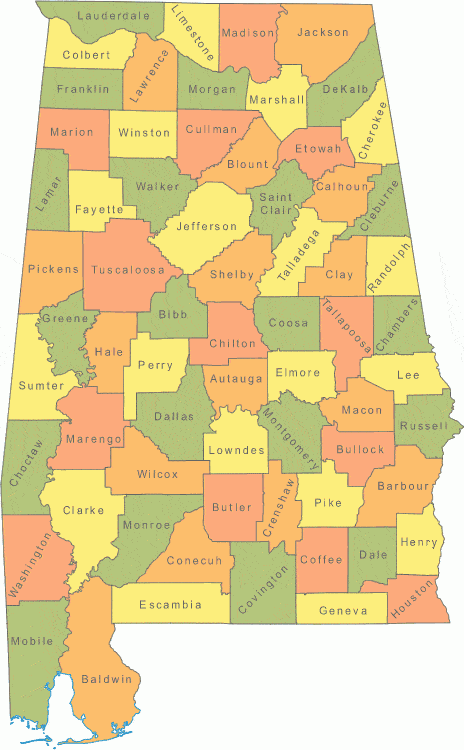So, you want to learn more about Alabama Genealogy? Perhaps you have tracked an ancestor down to the Heart of Dixie and have hit a wall, or maybe you know who your ancestor is and want to learn more about the local history so that you can understand what they were living through. Whatever the reason, this is a great place to start.

Jump to:
Alabama Genealogy: State History
Alabama entered the union in 1819 and was home to an important port in Mobile. By 1861, Alabama had seceded from the Union and helped form the confederacy. The state's economy would struggle during and after the Civil War. Alabama's population would play an important role in the world wars due to the large shipbuilding industry located along the coast. During World War II, Mobile, Alabama's population increased quickly due to another boom in the shipbuilding industry. The state would play an important role in civil rights with the Montgomery Bus Boycott, the 1963 Birmingham demonstrations, and the 1965 Selma March. It is also home to two prestigious NCAA football programs.
Alabama Genealogy: Guide to Alabama Counties
Here is a list of all the counties in Alabama. If you know the county your ancestor was in, then click the link, and it will take you to a page full of resources in that county. This is incredibly valuable in genealogical research. The more that you can isolate an area, the easier it is to track down your ancestor. Most likely, there are still family members that live in the area that would have knowledge of your ancestors, the cemeteries will hold valuable information, and the local libraries and genealogical societies can point you in the right direction.
AUTAUGA ∣ BALDWIN ∣ BARBOUR ∣ BIBB ∣ BLOUNT ∣ BULLOCK ∣ BUTLER ∣ CALHOUN ∣ CHAMBERS ∣ CHEROKEE ∣ CHILTON ∣ CHOCTAW ∣ CLARKE ∣ CLAY ∣ CLEBURNE ∣ COFFEE ∣ COLBERT ∣ CONECUH ∣ COOSA ∣ COVINGTON ∣ CRENSHAW ∣ CULLMAN ∣ DALE ∣ DALLAS ∣ DEKALB ∣ ELMORE ∣ ESCAMBIA ∣ ETOWAH ∣ FAYETTE ∣ FRANKLIN ∣ GENEVA ∣ GREENE ∣ HALE ∣ HENRY ∣ HOUSTON ∣ JACKSON ∣ JEFFERSON ∣ LAMAR ∣ LAUDERDALE ∣ LAWRENCE ∣ LEE ∣ LIMESTONE ∣ LOWNDES ∣ MACON ∣ MADISON ∣ MARENGO ∣ MARION ∣ MARSHALL ∣ MOBILE ∣ MONROE ∣ MONTGOMERY ∣ MORGAN ∣ PERRY ∣ PICKENS ∣ PIKE ∣ RANDOLPH ∣ RUSSELL ∣ SHELBY ∣ ST. CLAIR ∣ SUMTER ∣ TALLADEGA ∣ TALLAPOOSA ∣ TUSCALOOSA ∣ WALKER ∣ WASHINGTON ∣ WILCOX ∣ WINSTON
An individual doing Alabama genealogy research needs to consider the history of the state, the 67 counties, and the individual cities. Over the course of time, counties have merged, split up, and changed names, which can cause some confusion with the records. However, folks from Alabama are proud of their history and where they come from, which has preserved many important records.
Alabama Genealogy: Research Databases
If you have an Alabama ancestor, then here are a few links to help give you a quick start to finding them:
- Alabama Birth Records
- Alabama Marriage Records
- Alabama Death Records (1908 - 1959)
- Alabama Military Records
- Alabama Civil War Records
- Alabama Naturalization Records
- Alabama Newspapers
- Alabama Divorce Index (1950 - 1959)
The databases above should help you get started in getting some vital information on your ancestors. If you want to dig further, then you are going to need to narrow your search to the local counties, townships, and cities. Everyone leaves a trail of records, and it is just a matter of finding your ancestor in them.
That should be enough to get you started on your journey to researching Alabama genealogy and tracing your ancestor's footsteps.
Alabama Genealogy: Advanced Research Techniques
If you want to pursue your Alabama ancestor further after finding them in census reports or vital records, then the next step would be to contact local archives. Here is a list of places you should check out if you want to dive deeper:
- County Clerk’s Office: Contacting the county clerk can help you find some land records, court documents, and other interesting documents that will give you a deeper look into your ancestor’s life.
- Local Library: What were the newspapers during that time period? Most libraries have microfilm that will allow you to read what was going on during your ancestor’s life. Many libraries also have obituary collections.
- Local Genealogical Societies: Most counties have their own historical society, and many cities also have genealogical societies. It is quite possible that someone has come before you and done much of the research and has wrote it down. If that is the case, then a local genealogical society would have that document.
- Local Cemeteries: Finding the grave of your ancestor can also give additional clues.
- Local Civil War Re-enactment Groups: If you have an ancestor who fought in the Civil War and you know what unit they were in, then it would be beneficial to see if you can locate a re-enactment group for that unit.
